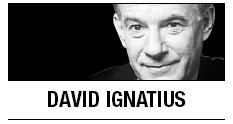RIYADH ― On a main boulevard here is a forbidding building, shaped like the base of an inverted pyramid, where the Interior Ministry has its headquarters. It’s a place that scares Saudi liberals, cheers conservatives and symbolizes the tightly controlled security of the kingdom. It’s also the home base of Saudi Arabia’s new crown prince and likely future king, Nayef bin Abdul Aziz.

During this Arab Spring of turbulence, Saudi Arabia has remained surprisingly calm. That’s due in part to the popularity of King Abdullah, and also to the efficiency of Prince Nayef’s security forces. The kingdom has had its protests, especially among Shiites in the eastern province, but they’ve been checked without the killing of civilians seen elsewhere.
What’s next for the kingdom? That question has been buzzing among Saudis and outsiders alike, ever since Nayef, 78, was named as successor in October following the death of Crown Prince Sultan. Future political stability here is a crucial variable as violence spreads in Egypt and Syria.
Nayef is something of a mystery, even to many Saudis. He is regarded as being close to the religious establishment, which makes him a lightning rod for liberal critics. And he has made worrying statements, such as questioning whether any of the 9/11 bombers were Saudis (15 were), though he has also taken tough actions against al-Qaida. He’s described as shy, studious, a strong manager ― but beyond that most observers just shrug.
Nayef’s appointment caused a rare public tiff in the royal family last week when Prince Talal, a liberal who was among a handful of older princes who were passed over, resigned from a council that was supposed to advise on the succession.
The message Nayef and his closest advisers want to send is continuity. He privately gave that reassurance to Vice President Joe Biden last month, and one of his top advisers told me Nayef’s policies are the same as Abdullah’s: “We will continue reforms, on our speed and timetable.” Noting the turmoil that toppled Egyptian President Hosni Mubarak last February, he observed: “Wise people learn from others’ mistakes.”
Prince Saud al-Faisal, the kingdom’s foreign minister, said in an interview here: “I can’t imagine any change of direction when Nayef comes. Nayef has been a part of this government. He has agreed with all the policies of the king. If he can see a good thing, why would he change it?”
King Abdullah will be a hard act to follow. He is very popular in the kingdom, more so than outsiders sometimes realize. When he became regent in 1998, Abdullah initially was seen as a pious conservative whose loyalty was to the tribes and clerics, the same critique made of Nayef today. But Abdullah became something of a reformer: He rebalanced Saudi Arabia, bolstering the state and modestly curbing the Muslim establishment. Some hope Nayef will follow a similar path.
To understand Abdullah’s appeal, listen to the comments of a young, reform-minded Saudi named Bareah Alzubeedy, a journalist who did the unthinkable recently when she declared on a Saudi-owned television channel that the kingdom’s strict religious rules didn’t actually protect women. She bravely repeated that critique in an interview with me, but her most interesting comment was about the king: “We feel he is near the people,” she said. “We feel we have protection.”
Assessing Saudi political change is like watching the grass grow: It’s so gradual you barely notice it. Normal NGOs and political parties don’t exist, and activist networks are frail, even on the Internet. At a gathering recently in Jeddah of Twitter activists, it’s said, most had never met before.
The challenge for Nayef will be to reach out to younger Saudis while keeping his power base with the Muslim establishment. The clerics’ support has helped the House of Saud weather the turmoil sweeping the rest of the Arab world. Among Nayef’s key emissaries will be his sons, Saud and Mohammed, who serve as his chief of staff and as head of counterterrorism, respectively, and are well regarded in the West.
Here’s how Prince Saud, one of the Arab world’s wisest figures, sums up the future: “Saudi Arabia is going toward more participation by the people in running their affairs. You can never avoid what the people want, no matter what government you have.” Political growth in Saudi Arabia “may not be as quick as a revolution,” but “the more it changes, the more change continues.”
You can only hope that he’s right ― and that change and stability find a balance in the kingdom.
By David Ignatius
David Ignatius’ email address is davidignatius@washpost.com. ― Ed.
(Washington Post Writers Group)




![[Herald Interview] 'Trump will use tariffs as first line of defense for American manufacturing'](http://res.heraldm.com/phpwas/restmb_idxmake.php?idx=644&simg=/content/image/2024/11/26/20241126050017_0.jpg)


![[Health and care] Getting cancer young: Why cancer isn’t just an older person’s battle](http://res.heraldm.com/phpwas/restmb_idxmake.php?idx=644&simg=/content/image/2024/11/26/20241126050043_0.jpg)
